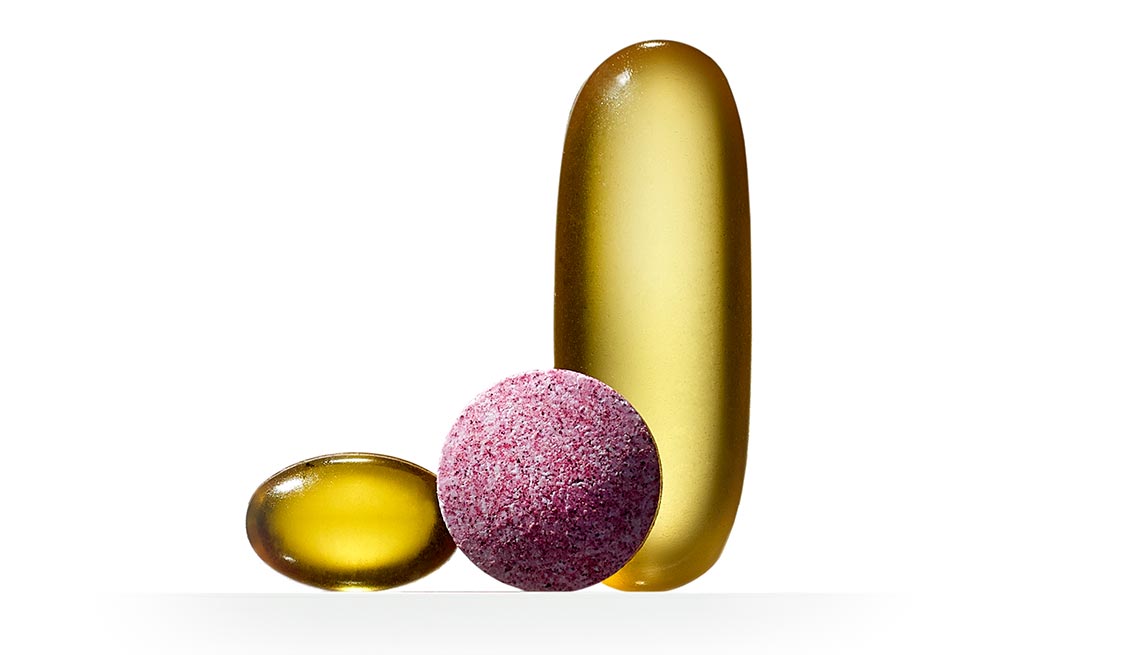Supplements to Take in Your 50s, 60s and 70s
Get an edge over osteoporosis, heart disease, even cancer, with the right vitamins
by Amy Paturel, AARP The Magazine |
PHOTOGRAPH BY SUE TALLON
Do you need a multivitamin? It can’t hurt, but likely won’t help. If you take one, try a formulation for people 50-plus.
En español l In an ideal world you would get all of your nutrients from fruits, vegetables and other unprocessed whole foods. But as you enter your 50s, hormonal changes make hitting your target quotas for certain vitamins and minerals increasingly difficult. While science can’t re-create everything nature has perfectly packed into whole foods, supplementing your diet with these key nutrients should help you stay on top of your game.
In Your 50s
Vitamin D and calcium: Bone loss accelerates during your 50s, especially among women. “Since estrogen helps maintain bone mass, women become more vulnerable to bone loss after menopause,” says Diane McKay, a nutrition researcher at Boston’s Tufts University. Recommended dose: 600 international units of vitamin D plus 1,000 milligrams (mg) of calcium for men and 1,200 mg for women, split into two daily doses.
Good food sources: Tuna, mackerel, beef liver, cheese, egg yolks are rich in vitamin D. To boost your calcium intake eat cheese, yogurt, milk, figs
Omega-3 fatty acids: Omega-3s help prevent irregular heartbeats, reduce plaque buildup in the arteries, inhibit inflammation and keep blood sugar levels in check. “Omega-3s are important for reducing inflammation wherever it comes up, whether as heart disease, cancer or Alzheimer’s,” says Christine Gerbstadt, M.D., author of Doctor’s Detox Diet. Recommended dose: 1,000 mg of EPA and DHA omega-3s per day.
Good food sources: Flaxseed oil, salmon, walnuts, edamame
Probiotics: The older you are, the more vulnerable your system is to unhealthy bacteria. “If your gut isn’t healthy, your body can’t absorb nutrients, so it doesn’t matter what supplements you take,” says nutritionist Jonny Bowden, author of The 150 Healthiest Foods on Earth. Probiotics help by reintroducing good bacteria. Recommended dose: 1 billion to 10 billion CFUs a few days a week.
Good food sources: Yogurt, kefir, kimchi, dark chocolate
In Your 60s
Dietary requirements change as you get older, and while experts recommend getting most of your nutrients from food, sometimes that isn’t possible. “Our guts become less efficient as we age, particularly when we reach our 60s and 70s, and that limits our ability to get sufficient nutrients from food,” says Tufts University’s McKay. Supplementing your diet with these key nutrients should help you stay on top of your game.
Vitamin B12: Even a mild vitamin B12 deficiency may put older adults at risk for dementia, according to a study published in the Journal of the American Geriatrics Society. But stomach acid, which is required for the body to absorb vitamin B12 from food, begins to decline during your 50s, so the Institute of Medicine recommends getting your B12 levels checked and supplementing if necessary. Recommended dose: 2.4 micrograms daily.
GETTY IMAGES
Boost your memory with omega-3’s.
Good food sources: Clams, beef liver, trout, cheeseburger, sirloin
Omega-3: DHA is the most abundant omega-3 fatty acid in the brain’s cell membranes. Over the past decade, studies have linked omega-3 fatty acids to brain benefits ranging from better blood flow and increased growth of brain cells to improved mood and enhanced memory. Unfortunately, as you age, your brain cells gradually lose the ability to absorb DHA, starving your mind and compromising both brain function and memory retention. Recommended dose: 1,000 milligrams of DHA and EPA per day.
Good food sources: Flaxseed oil, salmon, walnuts, edamame
Vitamin D: For years, scientists thought vitamin D’s only role was to enhance the absorption of calcium from food. Now research shows that vitamin D can…
This article was sourced from AARP.

toller Artikel, danke!